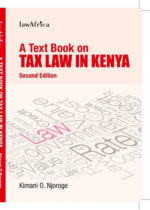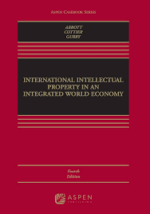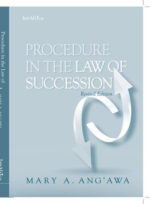The rules of trade can be sophisticated and misunderstood by business people. In this book the author concisely explains the history of tax, how VAT is calculated with the aid of examples, the functions and the role of Kenya Revenue Authority, different trade treaties agreements, terms and documentation.

Introduction to Tax Law Revised Edition
KSh 1,600.00
The rules of trade can be sophisticated and misunderstood by business people. In this book the author concisely explains the history of tax, how VAT is calculated with the aid of examples, the functions and the role of Kenya Revenue Authority, different trade treaties agreements, terms and documentation.
2 in stock
Related products
-
A Text Book on Tax Law in Kenya
KSh 2,980.00A Text Book on Tax Law in Kenya is a treatise on Kenyan tax law. It is a reference book for the training of advocates, accountants, tax agents, consultants, business owners, public among other professionals interacting with tax matters. It is an indispensable handbook for any professional pursuing a career in tax including the decision makers, Judges, Magistrates, and Tax Tribunals. It is an extensive summary of the tax law in Kenya and the tax jurisprudence emanating from Kenyan Courts and Tax Appeal Tribunal.
-
THE NEW CONSTITUTIONAL LAW OF KENYA: PRINCIPLES, GOVERNMENT AND HUMAN RIGHTS
KSh 2,400.00On 27 August 2010, a new Constitution for Kenya was promulgated. The Constitution seeks to re-orient the country by establishing a robust dispensation for good democratic governance amenable to the exercise of human rights. This book is tailored to unveil to the reader the fundamental normative and institutional frameworks of Kenya’s new Constitution. Not only does it define key concepts in constitutional law, generally, it also details how government in Kenya has been restructured and re-organised to give effect to the traditional principles that form the basis of constitutional law.
The golden thread that cuts across the various chapters of the book is the emphasis that good constitutions anchor certain tenets that have garnered recognition as hallmarks of democratic dispensation.These hallmarks include the concept of separation of powers; the doctrine of the rule of law; constitutionalism and human rights. These attributes have largely been secured by the 2010 Constitution. Thus, this book is expected to contribute to this new promise by making knowledge on the Constitution accessible through breaking down and contextualising its provisions. It is certain to be useful to law and government students, lawyers, researchers and other persons who seek to understand the new constitutional order. Morris Kiwinda Mbondenyi, LL.D., LL.M. (UNISA), LL.B. (Moi), Senior Lecturer and Head of Department, African Nazarene University. J Osogo Ambani, LL.D. (Cand), LL.M. (UP), LL.B. (UoN), Lecturer, MoiUniversity School of Law. -
Equity and Trusts-DAVID BAKIBINGA
KSh 2,800.00The book provides an overview of equitable principles in Uganda and links this with the maxims of equity and the distinction between equitable and legal interests. The book will benefit students offering Equity and Trusts
and Estate Planning in East African universities as well as legal
practitioners, insurance, social security and corporate operators. -
Administrative Law and Process in a Nutshell
KSh 8,190.00This book offers a concise, knowledgeable guide to administrative law. In straightforward, readable prose, the authors not only summarize the dominant statutes and case law in the area, but also discuss informal administrative processes and the background realities of the regulatory state. Students can use the book as a complement to any major casebook, and practitioners will also find it an excellent brief introduction to this complex and important subject.
-
International Intellectual Property in an Integrated World Economy (Aspen Casebook)
KSh 60,000.00International Intellectual Property in an Integrated World Economy, Fourth Edition by Frederick M. Abbott, Thomas Cottier, and Francis Gurry, provides a comprehensive treatment of the international intellectual property system across the spectrum of intellectual property rights and interests. It introduces the institutional architecture at the multilateral, regional/plurilateral, bilateral and national levels. For each form of IP, it addresses the technical legal rules and illustrative jurisprudence, as well as economic and social welfare implications. Each of the authors has played a role in the development and implementation of the international rules, and they bring their experience to bear in introducing students to the field.
New to the Fourth Edition:
- The latest developments in bilateral and regional agreements regulating intellectual property, including NAFTA 2.0 (USMCA), CPTPP, and CETA
- Important new judicial decisions, including the U.S. Supreme Court decision adopting international exhaustion of patents and CJEU decisions addressing trademarks, geographical indications, and copyright
- Developments in IP and human rights; IP and competition law; and IP and health
- The WTO panel report in the Australia-Tobacco case
Professors and students will benefit from:
- An approach to the international IP system that situates the rules within the broader context of international law and the public policy objectives that governments, industry, and interest groups are seeking to achieve
- Case law from international dispute settlement bodies, as well as from national and regional courts
- Discussion of patent, trademark, geographical indication, copyright, design, trade secret, and data protection; as well as plant variety protection, protection of genetic resources and traditional knowledge, and the role of open source
- An explanation of the new European Union Unitary Patent system
- Exploration of the increasingly important role of emerging market IP systems
- Materials to help students understand the disputes between the United States and China involving IP, investment, and transfer of technology
- Inclusion of important jurisprudential developments
-
Procedure in the Law of Succession in Kenya-Mary Angawa
KSh 1,800.00One of the difficulties courts have been having in the past in dealing with the Law of Succession Act, had been with the issue of marriage. The Succession Act and the Marriage Act were to have come into operation simultaneously. This did not occur until almost 50 years later. The Marriage Act was gazetted on the 6 May 2014. Parliament amended and consolidated “the various laws relating to Marriage and Divorce and to connected purposes.”
-
LEGAL PRACTICE MANAGEMENT
KSh 3,500.00This book seeks to illuminate the expansive nature of legal practice in the society. It is also aimed at provoking further debate, research and publication. The author draws from her knowledge and experience as an Advocate, Accountant, Certified Secretary and Governance expert.
-
Accounting for Lawyers
KSh 1,200.00This book recognizes the fear faced by many law students and to a great extent the practicing lawyer concerning accounting and seeks to provide a basic and simplifi ed understanding to accounting principles for those who have no previous accounting background while at the same time introducing some advanced topics for students with previous exposure and thus a deeper scope of accounting principles. The book also sought to incorporate key accounting principles and relevant changes and developments in the Kenyan industry. A comprehensive glossary of terms has been provided to assist learners in grasping key meanings and explanations








Be the first to review “Introduction to Tax Law Revised Edition”